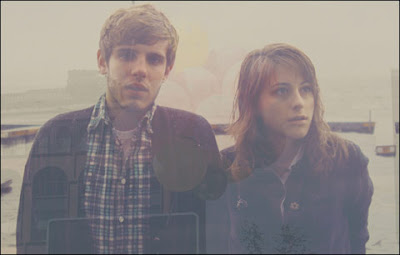The Ontario duo's most recent release, The Years EP (Danger Village), takes its title from Woolf's temporally experimental novel. Their "To the Lighthouse" and "The Waves" borrow accordingly. The songs here — small-scale sketches of shifting perspective, overlapping voices, and stream-of-conscious somnolence — are built with little more than reverberating guitar, clouds of æthereal static, and singer Denise Nouvion's washed-out exhalations. Woolf herself similarly appealed to the ear: "The wave paused, and then drew out again, sighing like a sleeper whose breath comes and goes unconsciously."
"We're both huge Virginia Woolf fans," says 23-year-old Evan Abeele, the composer half of Memoryhouse. The band's name itself is an homage to the neo-classical album by composer Max Richter. But whereas he trades in moments of sweeping cinematic uplift, Abeele's work tends toward the moments of quiet epiphany.
The surprise is, few people have picked up on the Woolf connection. "I think the way Woolf writes about memories, especially in the section 'Time Passes' [from To the Lighthouse], really related to what we wanted to convey musically," Abeele explains. "The sense of nostalgia, but also the sense of desolation." The passage, like Memoryhouse's music, represents the movement of time, suggesting death and loss and loneliness.
"Sleep Patterns" is loosely based on Mrs. Dalloway. "Water stains on the pillow where I lay my head, will they say that I was sleeping when awake?", Nouvion sings in a voice of haunted isolation. It's old Clarissa herself come to chill-wave life.
The emotional undulations Nouvion expresses on "Sleep Patterns" coalesce into one perspective, even when the point of view is shifting. "I definitely feel like with alternating voices there's a duality with what is being said and what is being sung," says Abeele, who acknowledges how precious much of this could sound. He himself calls the band's efforts pop music. "A song like 'Lately' or 'To the Lighthouse' could be seen like a dry recollection of a time of past trauma, or kind of hopeful and more buoyant. Everyone has their own interpretation of it. Some people find it really comforting, and I guess others find it really depressing."
The Memoryhouse project began roughly a year ago, as an attempt to blur the lines of genre identity. Abeele was writing classical ambient pieces, and Nouvion would use photographs to create a synthesis between image and sound. Today, their live show incorporates collages of found video footage that weave a narrative throughout the performance. To wade into the band's stream is to become undone in terms of temporal logic. It's nostalgic, but for a vaguely unknown experience. "When people think of music today, they try to compartmentalize it into different genres," Abeele concludes. "I think the sound we have right now fits out of time. It's something that could have happened many years ago, but it also sounds contemporary."
![]()


No comments:
Post a Comment